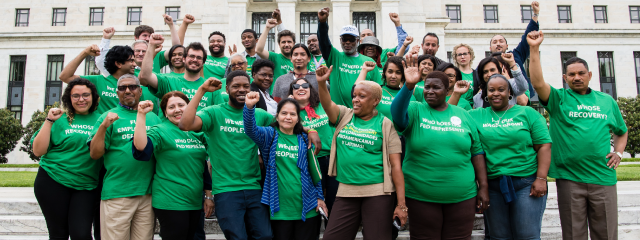Blog
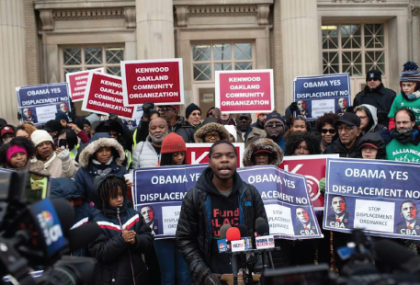
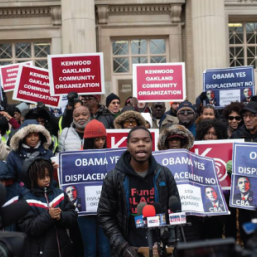
During the summer of 2016, residents of South Shore and Woodlawn, two historically disinvested Black communities in Chicago, learned the Obama Presidential Center would be built on land adjacent to their neighborhoods. Familiar with the potential risks of displacement and gentrification that all too often come from such high-profile developments, the Kenwood-Oakland Community Organization (KOCO) went to work with two partner organizations to co-found the Obama Community Benefits Agreement (CBA) Coalition.
The CBA Coalition effectively spent the last three years engaging and activating their members around this issue––resulting in the political will and public support to introduce a city ordinance. The ordinance seeks to immediately address the rampant displacement of low-income and working families from these communities as a result of ongoing real estate speculation. Through this campaign, KOCO has built a dynamic coalition, and are identifying and igniting new leaders while growing their base of supporters – 91% of impacted residents voted in favor of the ordinance through a local referendum.
KOCO’s fight has just begun. The CBA ordinance currently sits within the Housing Committee of Chicago’s City Council, chaired by Alderman Harry Osterman, whose ward sits nearly 20 miles away from the impacted community. Despite 29 aldermen signing-on in support with 26 votes required for passage Alderman Osterman refuses to follow the council’s democratic process and allow a committee hearing or vote to enable the ordinance.
KOCO has no choice but to keep the pressure on Alderman Osterman and solidify support from the mayor’s office. Securing this victory, will allow thousands of vulnerable residents in these communities, including senior citizens and single moms to stay in their homes, and set an important precedent for how development should take place in low-income and working communities to protect residents from displacement.
Stand with this important campaign by following the coalition’s progress on twitter @ObamaCBA. You can also take action and tell Alderman Osterman to stop withholding democracy for the residents of South Shore and Woodlawn by tweeting your message to @48Ward.
Finally, none of this work would be possible without support from people like you! Please make a $10 donation to this campaign today and support KOCO’s fight for keep people in their homes!
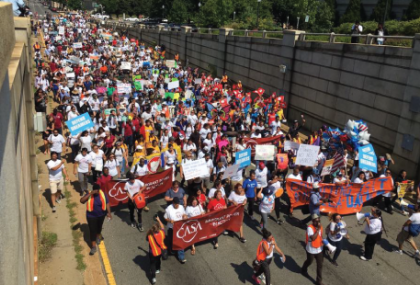
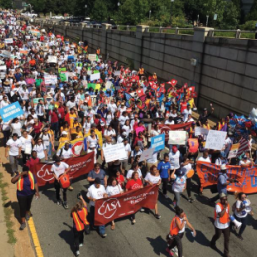
Since the election of Donald Trump, immigrant communities have come under repeated attacks across the country. After a series of executive orders aimed at restricting legal immigration and expanding deportations, the announcement that the DACA (Deferred Action for Childhood Arrivals) program–– which provided temporary relief for over 800,000 immigrant youth––would be discontinued, came as a major blow on September 5, 2017. It was followed in quick succession by announcements of TPS (Temporary Protected Status) cancellation of effectively rescinding temporary legal status given to over 200,000 people from specific countries in central america, africa, and the carribean after natural disasters - some of them for more than 20 years. Over one million immigrants could stand to lose hard fought temporary legal status and work authorization in this country.
On top of this, the Trump administration attempted to further drive immigrants into the shadows by threatening to include a question about citizenship on the 2020 census, threatening to restrict access to legal immigration for those working class families who might be deemed a "public charge," and funnelled money into private prison industries by scaling up detention for families, children, recent border crossers, and anyone else possible.
At CASA, these repeated attacks were devastating to their membership of 100,000 ––the vast majority of them first generation immigrants. But CASA members are resilient by nature and fought back, returning to the nation’s capital over a dozen times in 2017 to rally, march, and protest. They fought back at the ballot box, registering thousands of voters in 2018 and mobilizing Latinx voters across their locale. And they fought back in the courts, filing five lawsuits against the Trump administration.
Leading the marches and suing in court were powerful working class immigrants. CASA members like Maya Ledezma; a leadership council member, Mexican immigrant, and small business-owner from Riverdale, MD who was deposed in CASA's lawsuit against the administration for pushing the citizenship question on the census. On June 27, 2019 the Supreme Court decided not to erase millions of immigrants across the country in the upcoming 2020 census––a major victory for Maya, CASA, and millions of other immigrants across the country.
Misael Garcia, a longtime CASA member, DACA holder and teaching assistant in Baltimore, MD, had just become a new dad weeks before the program was cancelled and decided to join CASA's lawsuit against the Trump Administration to preserve DACA. He was thrilled to be seated in the gallery at the House of Representatives when legislation was passed that would provide a permanent path to citizenship for millions of DACA holders like him.
Now, without a senate vote, TPS and DACA continue to hang in the balance, and federal courts will make important decisions in the next few months. The 9th circuit is expected to rule this fall on the fate of TPS, and the Supreme Court will hear oral arguments on the termination of DACA in November. Learn more and join CASA in their work here!
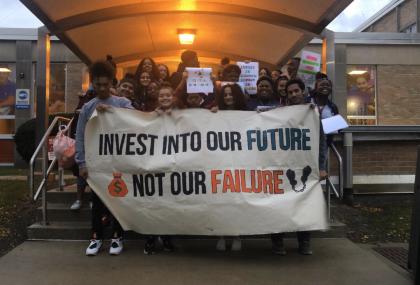
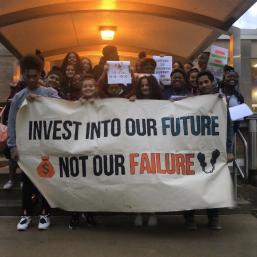
On October 22, the Milwaukee Public School Board of School Directors held a public hearing on a proposed $217,600 contract with ADANI Systems, Inc. that would provide airport-style x-ray machines in more than a dozen Milwaukee public high schools.
Following months of pressure and advocacy, LIT mobilized to make sure youth voices were heard at the hearing. They had more than 15 young people testify at the hearing, helping drive home the fact that the contract that would further criminalize students of color and highlighting the lack of evidence showing metal detectors do anything to make schools safer. They conveyed that what is truly needed is investments in trauma-informed schools and mental health care.
via @LITMKE
In a letter to addressed to the Board’s Committee on Accountability, Fiance, and Personnel in the final hours before the vote, LIT stressed:
“The x-ray machines from ADANI Systems, and ones like it, are part of a larger trend of policing Black and Brown young people across the nation and often result in students being funneled into the criminal legal system rather than a learning environment. The first two types of clients ADANI Systems markets its X-Ray screening equipment to are Prisons and Correctional Facilities, and Customs and Border Crossings. Authorizing the contract allowing for the purchase and maintenance of these machines will further a racist system of school security and companies profiting off of public fear for children’s safety without providing honest solutions.
via @LITMKE
Not only is policing and punitive discipline ineffective and discriminatory it is also an incredibly expensive drain on public funds that could be used to fund supports and resources for young people... While X-ray machines, surveillance cameras, and more policing perpetuate the school-to-prison-and- deportation pipeline, studies have shown that the best way to ensure school safety is to create an inclusive learning environment where students can grow."
The group also garnered support from advocates across the country, including Dr. Rosalind Osgood, a Broward County School Board member and Local Progress member in Florida, who penned a powerful letter to the school board on their behalf.
via @LITMKE
After their press conference and testimony, the Committee voted NO on the proposed contract!
As LIT celebrates this incredible victory, they’re also prepared to continue the long fight. There is still a deeply seeded school-to-prison-and-deportation pipeline in Milwaukee that must be dismantled.
LIT also recently endorsed the Youth Mandate for Presidential Candidates, calling on presidential hopefuls to commit and take concrete steps to permanently dismantling the school-to-prison-and-deportation pipeline. In the coming months, LIT will continue working with CPD, other CPD affiliates and movement leaders to engage with presidential hopefuls on the issue at a national level.
Leaders Igniting Transformation (LIT) is a youth of color-led organization focused on developing the leadership of young people through civic engagement and advocacy to create political power that meets the needs of young people. LIT believes MPS students of color face MPS’ challenges most directly and therefore have the best solutions. Back in July, they also achieved a $600,000 divestment from police and school security into funds that now support six new mental health positions focused on trauma-informed care.
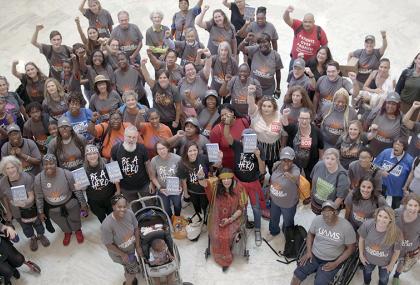
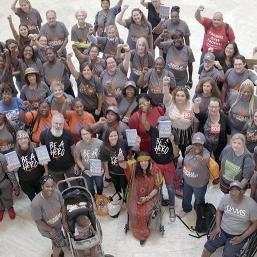
From September 9-13, the CPD Network held a week of action to Welcome Back Congress from its summer recess. Birddoggers and CPD affiliate members from over 20 states greeted elected officials as they arrived at the airport to demand that they move on legislation we need in this country, advocated for affordable housing, protested the nomination of more ultraconservative judges, and put their bodies on the line for criminal justice reform. The key message: Members of Congress must work for the people who elected them to office. These series of actions made headlines in the Philadelphia Inquirer, Reuters, Curbed, NowThis, The Huffington Post, Newsweek and many more.
A few key highlights from the week of action include:
-
CPD affiliates gathered with over 300 people to attend a hearing on housing policy. After, activists and tenants visited the offices of some of Congress’s worst perpetrators of the affordable housing crisis. More recently, presidential candidate and U.S. Senator Bernie Sanders introduced his housing platform that is largely based on the federal housing platform that CPD affiliates spent over a year crafting. A few days following Sanders’ announcement, Rep. Alexandria Ocasio-Cortez introduced A Just Society legislation to Congress which includes CPD’s historic housing bill that, among other provisions, calls for the Federal government to implement universal rent control for the first time since World War I and for a massive investment in affordable housing.
-
Hundreds joined CPD affiliates to read from Ady Barkan’s book, Eyes to the Wind, in several offices of progressive Congressional members and senators, including Elizabeth Warren’s and Sanders’s offices. The group delivered thank you letters from Ady for its support of his healthcare and financial reform activism and asked those who have not signed on to Medicare for All to do so. Activists also shared their own stories of battling an ineffective and unaffordable healthcare system.
-
Immigration activists from Make the Road NY, PA, NV, and CT all lobbied their members of Congress followed by a visit to Immigration and Customs Enforcement (ICE) headquarters to protest and share stories of family separation. The group then made its way to the home of Amazon founder and CEO, Jeff Bezos, to shut down the street, deliver him flowers, and demand that he stop supporting ICE.
The CPD Network is gearing up for more sustained action throughout the remainder of the year and leading into 2020. Our communities are on the front lines of the fight to legislate a progressive agenda that can create needed structural change in our country and motivate people to engage civically. From immigration justice to workers’ rights, universal healthcare to affordable housing, climate justice to justice transformation, CPD’s affiliates and allies will not stop until our federal agenda becomes reality. Please make a donation now to support this critical work.
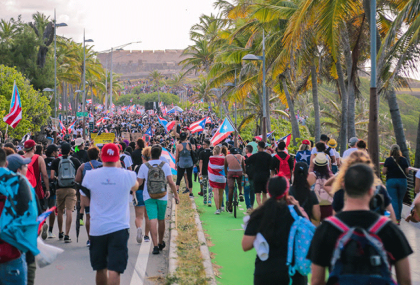
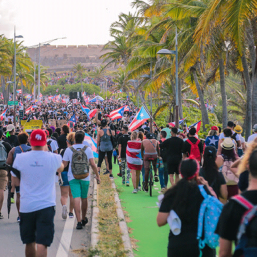
In 2017, CPD launched the María Fund (MF) to provide emergency funding to Puerto Ricans devastated by Hurricane María and raised over $7 million to help community-based groups. Earlier this year, the MF Advisory Committee, MF staff, Puerto Rico affiliate Taller Salud, and CPD leadership met to celebrate the accomplishments of the fund and to discuss its future. There, a decision was made to transform the fund from a short-term project housed at CPD to a stand-alone, Puerto Rico-based, permanent organization—a long-term resource mobilization vehicle for the Puerto Rican people.
The fund was launched in partnership with, and at the request of Puerto Rico CPD affiliate Taller Salud, and allies on the ground in Puerto Rico on the anniversary of the day that Hurricane María hit Puerto Rico. Their vision was to build the kind of fund that’s desperately needed in moments such as these, and based on extensive climate disaster experience throughout the years in the CPD family of organizations.
The María Fund was created intentionally knowing that Hurricane María would most impact communities of color and low-income communities. Furthermore, those communities would likely have been excluded from immediate relief and long-term recovery efforts, and corporate powers and corrupt elected officials would aim to orchestrate a large-scale disaster capitalism plan after the storm. The CPD Network knew that local organizing groups would need to massively step in as the main providers of short-term relief and as the resistance to longer-term power grabs. We wanted to make sure that decisions about Puerto Rico were made by Puerto Ricans, with nearly 100% of the funding dedicated to organizing groups to transform the root causes of racial capitalism, colonialism, the climate crisis, and more.
Since its founding, the María Fund has moved resources to grassroots efforts that show a strong commitment to organizing historically marginalized people at the intersections of the deepest inequalities in Puerto Rico. To date, it has moved more than $4 million in funding to 49 initiatives and organizations working on crucial short- and long-term projects. See the newly released María Fund impact report for more. The María Fund has also activated major and grassroots funders. Over half of the $7 million raised came from 36,000 individual donors.
Going forward, the María Fund will focus on strengthening a powerful and aligned ecosystem of power-building movement leaders, organizations, and initiatives in Puerto Rico—vital work anywhere and especially in Puerto Rico at this critical juncture. As a first step, the María Fund will be moving from CPD to Tides Foundation and will create the infrastructure necessary for an independent entity with a long-term vision for intentional and responsible resource distribution. Continue to follow the María Fund by signing up for its mailing list here.
CPD is thrilled to support the future of the fund and excited for how it can continue to support the beautiful and incredible organizing of the Puerto Rican people.


Earlier this month, CPD, Alliance of Californians for Community Empowerment (ACCE), and Hedge Clippers released a report which showed how corporate landlords are contributing to and profiting from California’s housing crisis. Titled Billionaire Corporate Landlords: Exacerbating California’s Housing Crisis, the report focuses on two of the largest and wealthiest corporate landlords in California: Invitation Homes, which is controlled by The Blackstone Group, one of the largest private equity and asset management firms in the world, and Equity Residential, which is also the third largest apartment owner in the United States. Millions of Californians are rent burdened, or paying over 30% of their income on rent, which often means not having enough money for food or health care and can put people at risk of housing instability, eviction, and homelessness.
This crisis is particularly acute in low-income communities, which overwhelmingly pay a large portion of their already-small income on housing, and communities of color, who have faced decades of legal and extra-legal residential segregation, housing discrimination, predatory lending, and exclusionary lending practices, such as redlining. Meanwhile, Invitation Homes and Equity Residential report hundreds of millions of dollars in profits while also benefiting from tax loopholes, allowing them to pay less than their fair share of taxes. The report outlines what these tax loopholes look like and also how corporate landlords, like Invitation Homes and Equity Residential, spend millions on lobbying and campaign contributions in order to maintain a rigged system that permits ever-increasing rents, burdening renters and leaving them with few protections.
The report supported ACCE’s successful organizing efforts to pass the Tenant Protection Act of 2019, which caps yearly rent increases to no more than 5% plus inflation and expands protections to 7 million renters. The bill passed the California State Assembly on September 11 and is waiting for Governor Gavin Newsom’s signature, which he has pledged. Read the report here.
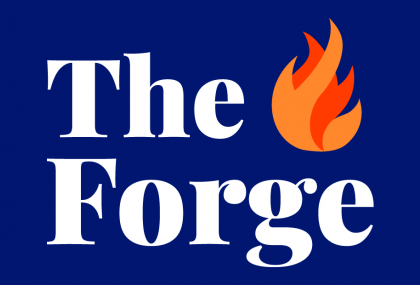
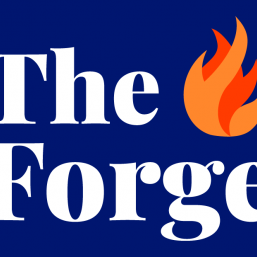
Leadership from CPD are connecting with allies from the community, labor, and movement organizing sectors to launch a new, online journal for organizers. The Forge: Organizing Strategy and Practice went live September 27 and features articles, videos, and interviews from an array of organizers from across the country.
To get connected, you can follow The Forge on Twitter at @ForgeOrganizing or click here to be added to our list. Built by a committee of organizers, The Forge will tackle questions of strategy, methodology, movement history, and more. But in the digital age, publishing is no longer a one-way street. To foster interaction, The Forge also aims to help organizers build community, share ideas, and strengthen their practice.
The founding issue includes seventeen pieces of content, including:
-
Lead essays from some of the key organizers of the Kavanaugh fight a year ago, including CPD’s own Ana Maria Archila and Jennifer Flynn Walker, Shaunna Thomas from Ultraviolet, Kelley Robinson from Planned Parenthood, Ilyse Hogue from National Abortion Rights Action League (NARAL), and Fatima Goss Graves from the National Women’s Law Center
-
An article by Kate Hess Pace from Hoosier Action (Indiana) on building rural and small town organization in the Trump era
-
Book reviews by organizers on Naomi Klein’s new book on the Green New Deal, Ibram X. Kendi’s How to Be an Antiracist, and Ady Barkan’s Eyes to the Wind; more than just reviews, these pieces will ask organizing questions raised by the books in question.
-
Interviews with two up-and-coming organizers about their work, as well as with University of California, Santa Barbara Anton Vonk Professor Hahrie Han about the new Center on Democracy and Organizing
Read more on The Forge’s website! The editors invite all organizers and interested folks to sign up HERE to be added to the list for The Forge.
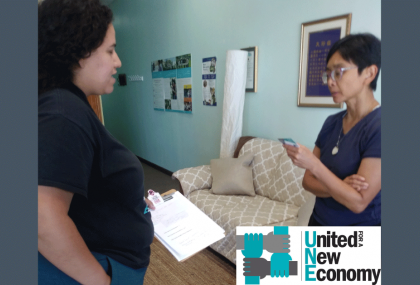
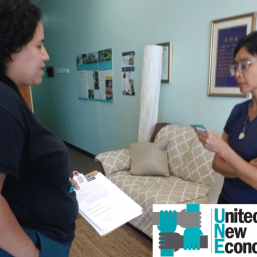
During the first week of September, CPD’S Canvass for Power program worked with Colorado affiliate United for a New Economy (UNE) to organize and expand their base through several intensive days of door-to-door meetings in Denver. As part of the Canvass for Power program, four Make the Road Nevada staff members traveled to Denver to support UNE’s efforts to build campaigns and chapters in Westminster and Commerce City, and help increase the number of community members reached through door-knocking.
UNE members are focused on holding landlords accountable for affordable housing, as well as fighting for paid family leave. This work is key in Westminster, which is represented by a moderate who needs to hear the progressive voices that UNE's hard work amplifies. CPD's Canvass for Power staff supported the training and organizing blitz. The team set outreach goals and scheduled follow-up calls according to a rigorous set of metrics.
In total, the group knocked on 1,744 doors, had 416 conversations, received 223 petition signatures, canvassed 49 small businesses and spoke with 36 small business owners. Organizers from UNE will follow up with their contacts in the hopes of bringing in new supporters with dues-paying memberships. This is one of more than a dozen organizing blitzes that CPD has held across the country since 2016 to build critical power in key states.
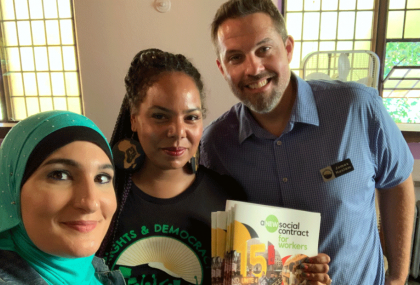
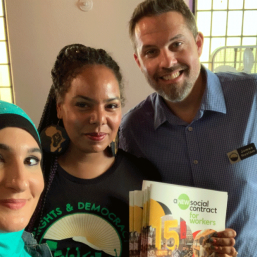
CPD affiliate Rights & Democracy Institute (New Hampshire and Vermont) hosted the launch of the New Social Contract national tour with local and national movement leaders on September 15, 2019. National speakers at the event included Linda Sarsour and Jennifer Epps-Addison, CPD Network President and Co-Executive Director, both of whom will be speaking at New Social Contract tour events throughout the country. Learn more about the tour by visiting newsocialcontract.org.
At the event, RAD released a new national report, The New Social Contract for Workers, calling on elected leaders and candidates to embrace a slate of new public policies to promote workplace democracy and human rights for America’s workers. The New Social Contract for Workers calls for re-envisioning our system of labor protections to empower workers and address the extreme racial inequality that characterizes our jobs and workplaces.
In addition to the Rights & Democracy Institute and the Center for Popular Democracy, the coalition releasing the report included the National Economic and Social Rights Initiative, the National Employment Law Project Action Fund, the People’s Action Institute, Jobs With Justice, and Caring Across Generations.
“A New Social Contract is central to our long-term vision to create a future that puts us on a path to creating just, healthy, and thriving communities for everyone. How do we do that? By focusing on bold, community-led solutions that reshape our economy and public policies to put our people and our planet before everything else. Along with Medicare for All and a Green New Deal, a New Social Contract for Workers is the type of bold solution we need to start moving immediately at the local, state, and federal levels.”—James Haslam, Executive Director of the Rights & Democracy Institute
“The people most marginalized by racial capitalism and corporate exploitation should have the biggest role in dreaming up and enacting the structural changes needed to build an economy that works for all of us. When those targeted by injustice are stakeholders and decision makers in public policy, we come up with solutions that are bold. We address the root cause of inequality, instead of patching over its effects. The New Social Contract is unapologetic in its ambition to address the root causes of racial and economic inequality. Put simply, the New Social Contract is a model for the future of policymaking,”—Jennifer Epps-Addison, CPD Network President and Co-Executive Director.
Please join us in congratulating RAD and the successful launch of its New Social Contract tour and campaign!
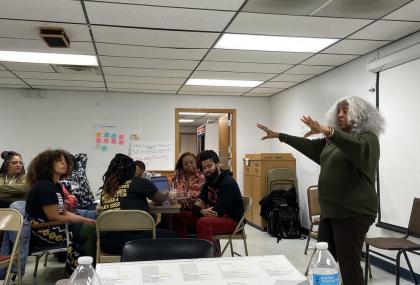
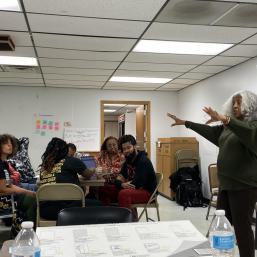
On Oct 4-5, 2019, Center for Popular Democracy, Law for Black Lives and PolicyLink held the first-ever Freedom Lab, a two-day divest/invest community workshop focused on redefining the way our society defines public safety.
Alongside local partners in Milwaukee -- including BLOC, LIT and the Liberate MKE campaign (which is calling for a $20 million divestment from the Police Department and investment into community priorities) -- the Lab had more than 25 organizers from Chicago, Madison, Minneapolis, and Detroit -- including a solid delegation from Detroit Action.
Over the two days, the group discussed challenges, opportunities, and lessons from ongoing and anticipated campaigns to demand we shift resources away from policing and prisons towards community investments in health and well-being.
There was a session on budget analysis 101 and a fishbowl conversation around campaign experiences -- in which LIT staff masterfully presented their recent victory at the Milwaukee school board redirecting money from school policing to trauma care.
There were also deeper dives into communications strategies, engaging with electoral politics/elected officials, and breakout sessions on lobbying and storytelling, and participatory democracy and power mapping.
The Freedom Lab developed a range of budgetary, campaign, narrative, organizing resources and tools, which the group anticipates converting into a more robust divest/invest toolkit for affiliates and the broader movement ecosystem.
The group is planning another Freedom Lab in Nashville in mid-November, where we will be inviting folks from around Tennessee, North Carolina, and Georgia.
STAY TUNED!



